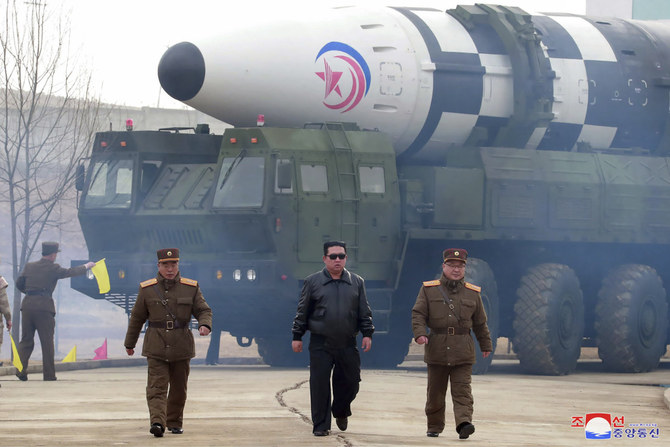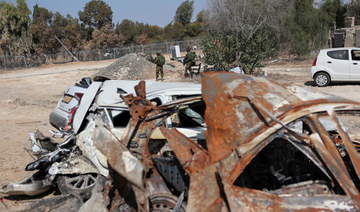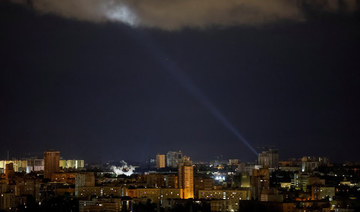SEOUL: North Korea has created a new holiday to celebrate the anniversary of the successful test launch of its Hwasong-17 intercontinental ballistic missile last year, state media reported Sunday.
On November 18, 2022, Pyongyang carried out what is believed to be the first full flight test of the Hwasong-17 — dubbed the “monster missile” by analysts.
The North’s Korean Central News Agency said on Sunday that the anniversary had been designated as a holiday at a meeting of the Presidium of the Supreme People’s Assembly.
“The establishment of Missile Industry Day marks a special event in our sacred journey of national defense development,” KCNA said.
With the launch, it added, North Korea had “demonstrated to the world the majesty of a world-class nuclear power and the nation with the strongest intercontinental ballistic missile.”
North Korea often carries out major weapons tests on key holidays, and Seoul’s spy agency said last week that the country was in the final stages of preparing for a third launch of a military reconnaissance satellite.
After a failed second attempt in August, Pyongyang said it would carry out the third launch in October, though it never materialized.
Analysts have said there is significant technological overlap between space launch capabilities and the development of intercontinental ballistic missiles, from which Pyongyang is banned under multiple UN sanctions.
North Korea has conducted a record number of missile tests this year, ignoring warnings from the United States, South Korea and their allies.
In September, Pyongyang enshrined its status as a nuclear power in its constitution, with leader Kim Jong Un calling for more modern atomic weapons to counter perceived threats from the United States.
North Korea creates new holiday to mark ICBM test launch
https://arab.news/w2t6m
North Korea creates new holiday to mark ICBM test launch

- The holiday is in celebration of the North Korea's anniversay of the first full flight test of its Hwasong-17 ICBM
- East Asia's impoverished nation often carries out major weapons tests on key holidays
Germany urged to explain Schengen ban on British Palestinian academic

- Dr. Ghassan Abu-Sittah, who has been volunteering in Gaza hospitals, was blocked entry to Germany and France in recent weeks
LONDON: A human rights group has urged Germany’s government to publicly announce if it has imposed a Schengen-wide entry ban on a British Palestinian surgeon and academic.
Dr. Ghassan Abu-Sittah, who has been volunteering in Gaza hospitals, was blocked entry to Germany and France in recent weeks and, on Thursday, Dutch officials told Palestine’s ambassador to the Netherlands he would not be allowed to enter the country for an event at the Palestinian Embassy in The Hague on May 15.
When blocked from entering France last Saturday, Abu-Sittah was placed in a holding zone at Charles de Gaulle airport before being expelled, according to French Sen. Raymonde Poncet Monge, who had invited him to speak at the senate.
Abu-Sittah posted to social media and told Human Rights Watch that French authorities at the airport had informed him he was barred due to a year-long ban imposed by Germany, without his knowledge.
A French official told the Associated Press that the German ban would be applied across the entire 29-country Schengen area.
“Dr. Abu-Sittah has seen firsthand the atrocities taking place in Gaza,” said Yasmine Ahmed, UK director at Human Rights Watch. “Germany should immediately explain why it has denied him entry and imposed this far-reaching ban on a leading health professional to speak in Berlin, Paris and The Hague about what he witnessed in Gaza.”
The prevention of Abu-Sittah from sharing his experience of treating patients in Gaza amid the Israel-Hamas war ravaging the enclave risked “undermining Germany’s commitment to protect and facilitate freedom of expression, and assembly and to nondiscrimination,” HRW said.
HRW also urged the UK and Scottish governments to push Germany into explaining Abu-Sittah’s Schengen-wide visa ban.
“In the midst of ongoing atrocities in Gaza, countries should be prioritizing ending complicity and promoting accountability,” Ahmed said. “Instead, Germany, in blocking Dr. Abu-Sittah from sharing his experience, is trying to block citizens from even hearing about the grave abuses taking place in Gaza. The UK government should immediately raise the reported ban with their German counterparts.”
Iraqi people smuggler who sent thousands across English Channel tracked down by BBC

- A BBC report released on Friday revealed how the organization tracked Majeed down and carried an interview with the fugitive
LONDON: A crime boss wanted in several countries for his role in the smuggling of an estimated 10,000 migrants across the English Channel has been tracked down, according to reports in the British media.
Iraqi Kurd Barzan Kamal Majeed, nicknamed “Scorpion” because of his WhatsApp avatar, had been missing since failing to appear in court in Belgium for a sentencing hearing in November 2022.
The UK’s National Crime Agency issued a warrant for his arrest that same year. Majeed had moved to the British city of Nottingham in 2013, but had been deported two years later.
A BBC report released on Friday revealed how the organization tracked Majeed down and carried an interview with the fugitive.
Rob Lawrie, a former soldier who now works with refugee support agencies, assisted the investigation, which tracked Majeed to his home in the Kurdistan city of Sulaymaniyah, close to the border with Iran.
During the interview, Majeed said he had lost count of the number of people he had helped smuggle and admitted that between 2016 and 2019 he was one of two people running a people-smuggling operation in Belgium and France.
However, he denied being the boss of the operation, adding: “A couple of people, when they get arrested, they say: ‘We’re working for him.’ They want to get less (of a) sentence.”
Majeed’s accomplice, Nzar Jabar Mohamad, was given a 10-year prison sentence at a British court in Oct. 2021 after admitting to attempting to bring 21 migrants into the UK.
He also denied culpability for the death of migrants who attempted the crossing, claiming he was merely a “money man” who “just took the money and booked places.” He added: “I never put anybody in a boat and I never killed anybody. Nobody forced them. They wanted to, they were begging the smugglers: ‘Please, please do this for us.’”
His profits from the operation, with some estimates putting the price of a crossing at £6,000 ($7,514) per person, enabled Majeed to purchase a villa in Marmaris in Turkiye, according to the local police
According to government figures, more than 9,000 migrants have crossed the English Channel in small boats so far this year, a 15-percent rise on the same period in 2022, which was a record-breaking year in which more than 45,700 migrants arrived.
In his interview with the BBC, Majeed claimed that some of his former co-smugglers were still operating today and that a few had even been granted British passports.
“In three days, one guy sent 170 or 180 people from Turkey to Italy, still holding a British passport. I want to go to some other country to do business. I can’t.”
Ann Lukowiak, a public prosecutor in Belgium who was part of the team that worked on convicting Scorpion, told the BBC she still hopes Majeed will be extradited from Iraq to face justice one day.
“It’s important to us to have sent the signal that you can’t do what you want,” she said. “We will eventually take him down.”
Modi critic joins India’s election campaign on bail

- Top court allows Delhi Chief Minister Arvind Kejriwal to leave custody until June 1
- His release is expected to give a boost to India’s opposition alliance in ongoing polls
NEW DELHI: Delhi Chief Minister Arvind Kejriwal joined India’s ongoing general election — boosting the opposition alliance on Saturday — a day after the Supreme Court ordered his temporary release on bail in a controversial graft case.
A fierce critic of Prime Minister Narendra Modi and the leader of the Aam Aadmi Party, Kejriwal was arrested in late March, in connection with corruption allegations related to the excise policy of the Delhi government led by him. He denies the accusations.
On Friday, the top court granted Kejriwal 21-day interim bail to campaign in the seven-phase general vote, which started on April 19. He has to surrender after the last day of voting on June 1.
“I will go around the country in the next 21 days to stop this dictatorship of Modi,” Kejriwal said at a conference in Delhi.
“After June 4, there will be no Modi government. In all states, their seats are going down and they will not get more than 220 to 230 seats.”
The results of the world’s largest election are set to be announced on June 4. The party or coalition that wins at least 272 of the 543 contested seats in the lower house of parliament will form the government.
Seeking a third straight term in office, Modi has been targeting 400 seats for the National Democratic Alliance led by his Hindu nationalist Bharatiya Janata Party, which has been in power since 2014.
He is challenged by an alliance of two dozen opposition parties, the Indian National Developmental Inclusive Alliance, or INDIA, of which Kejriwal’s AAP is a part.
Kejriwal has accused Modi and his BJP of damaging democracy, and abusing power and the constitution.
“The opposition’s morale will get a further boost,” said Satish Kumar Singh, a political analyst in Delhi.
“The release of Kejriwal further reinforces the opposition campaign on the need to save democracy and maintain fairness in the electoral process.”
Kejriwal’s AAP is a challenger to the BJP in Delhi and Punjab, where voting will take place on May 25 and June 1 respectively.
“Kejriwal’s release is a boost to the cadres of the AAP and the opposition alliance at this crucial time when the opposition alliance is challenging the dominance of the BJP in the capital city,” Andalib Akhtar, a New Delhi-based commentator and editor of The Indian Awaz, told Arab News.
“It’s good that the court has taken a decision in favor of democracy and is giving the opposition leader — who was arrested just on the eve of the general elections — an opportunity to be on an equal footing democratically.”
Saudi eye surgeons help 1,000 Sri Lankans regain sight

- KSrelief team consists of doctors from Saudi Arabia and Pakistan
- Untreated cataracts are the most common cause of blindness in Sri Lanka
COLOMBO: A Saudi eye surgeon team is helping 1,000 people in Sri Lanka regain sight with interventions facilitated by the King Salman Humanitarian Aid and Relief Center.
KSrelief’s Saudi Noor Volunteer Program to Combat Blindness started in the city of Kattankudy on Sri Lanka’s eastern coast on May 5 and will run through next week.
“This is a special program to combat blindness among patients who are suffering from a cataract,” M.S.M. Thassim, director general of KSrelief’s local partner, the Association of Muslim Youth of Sailan, told Arab News.
“From the total of 1,000 patients, 500 completed surgery and 500 more (surgeries) will be performed by May 16.”
Cataracts are the most common cause of blindness in Sri Lanka. Surgery to remove them is common, but government programs often require years of waiting. At private clinics, the cheapest lens replacement procedure costs about $300 — too expensive for many patients in poorer parts of the country.
“Cataracts are becoming a problem among the lower-middle class above the age of 40,” Thassim said.
“We perform cataract surgery and also give post-surgery treatment. The patients are from all parts of the island.”
The procedures are free of cost and conducted at the Kattankudy Base Hospital by Sri Lankan medics and six Saudi and Pakistani surgeons from KSrelief’s team.
One of the Saudi volunteers is Dr. Ehab Al-Sirhy, an eye surgeon from King Saud University Medical City in Riyadh.
“The amount of surgery done is an amazing number in such a short period,” he told Arab News, praising local hospital staff for their “excellent logistics and support.”
The medical campaign is part of KSrelief’s longstanding efforts to combat blindness in developing countries. Last year, the center’s team also visited Kattankudy and helped restore the vision of hundreds of patients.
“The results are very encouraging, so now everyone brings their friends and relatives, their grandmothers, their grandfathers,” Al-Sirhy said. “The (campaign’s) reputation is excellent.”
Russia claims more advances after Ukraine ground offensive

- Russia’s defense ministry said its troops had ‘liberated’ five border villages in the Kharkiv region
- The Kharkiv region has been mostly under Ukrainian control since September 2022
UKRAINE: Russia on Saturday said it had captured six villages in Ukraine’s east after launching a surprise ground offensive that prompted mass evacuations.
The defense ministry said its troops had “liberated” five villages in the Kharkiv region near the border with Russia — Borisivka, Ogirtseve, Pletenivka, Pylna and Strilecha — “as a result of offensive actions.”
The village of Keramik in the Donetsk region was also now under Russian control, it said.
Ukrainian officials said Russian forces made small advances in the area it was pushed back from nearly two years ago, the latest in a series of gains as Ukrainian forces find themselves outgunned and outmanned.
“A total of 1,775 people have been evacuated,” Kharkiv governor Oleg Synegubov wrote on social media.
He reported Russian artillery and mortar attacks on 30 settlements over the past 24 hours.
Groups of people could be seen coming in vans and cars with as many bags as they could carry at an evacuation arrival point outside the city of Kharkiv.
Evacuees — many of them elderly — registered and received food and medical assistance in makeshift tents.
“We must disrupt Russian offensive operations and return the initiative to Ukraine,” Ukrainian President Volodymyr Zelensky said on Saturday.
Ukrainska Pravda quoted military sources saying the Russian assault had resumed on Saturday near the village of Glyboke in Kharkiv.
The report could not be independently verified.

The Kharkiv region has been mostly under Ukrainian control since September 2022.
A senior Ukrainian military source said on Friday that Russian forces had advanced one kilometer into Ukraine and were trying to “create a buffer zone” in the Kharkiv and neighboring Sumy regions to prevent attacks on Russian territory.
Ukrainian forces have multiplied attacks inside Russia and Russian-held areas of Ukraine, particularly on energy infrastructure.
Moscow-installed authorities in the Russian-occupied Lugansk region in eastern Ukraine said four people were killed by a Ukrainian strike with US-made missiles on an oil depot in Rovenky.
Governor Leonid Pasechnik said the strike “enveloped the oil depot in fire and damaged surrounding homes.”
In Russia, two people were reported killed by Ukrainian strikes in the Belgorod and Kursk regions.
Ukrainian officials also reported a total of six civilians killed in Russian shelling in the Donetsk, Kharkiv and Kherson regions over the past day.
Officials in Kyiv had warned for weeks that Moscow might try to attack its northeastern border regions, pressing its advantage as Ukraine struggles with delays in Western aid and manpower shortages.
Ukraine’s military said it had deployed more troops and Zelensky said Ukrainian forces were using artillery and drones to thwart the Russian advance.
“Reserve units have been deployed to strengthen the defense in this area of the front,” it said.
The US-based Institute for the Study of War said on Friday that Russia had made “tactically significant gains.”
But the main aim of the operation was “drawing Ukrainian manpower and material from other critical sectors of the front in eastern Ukraine,” it said.
ISW said it did not appear to be “a large-scale sweeping offensive operation to envelop, encircle and seize Kharkiv” — Ukraine’s second biggest city.
Washington announced a new $400 million military aid package for Kyiv hours after the offensive began, and said it was confident Ukraine could repel any fresh Russian campaign.























